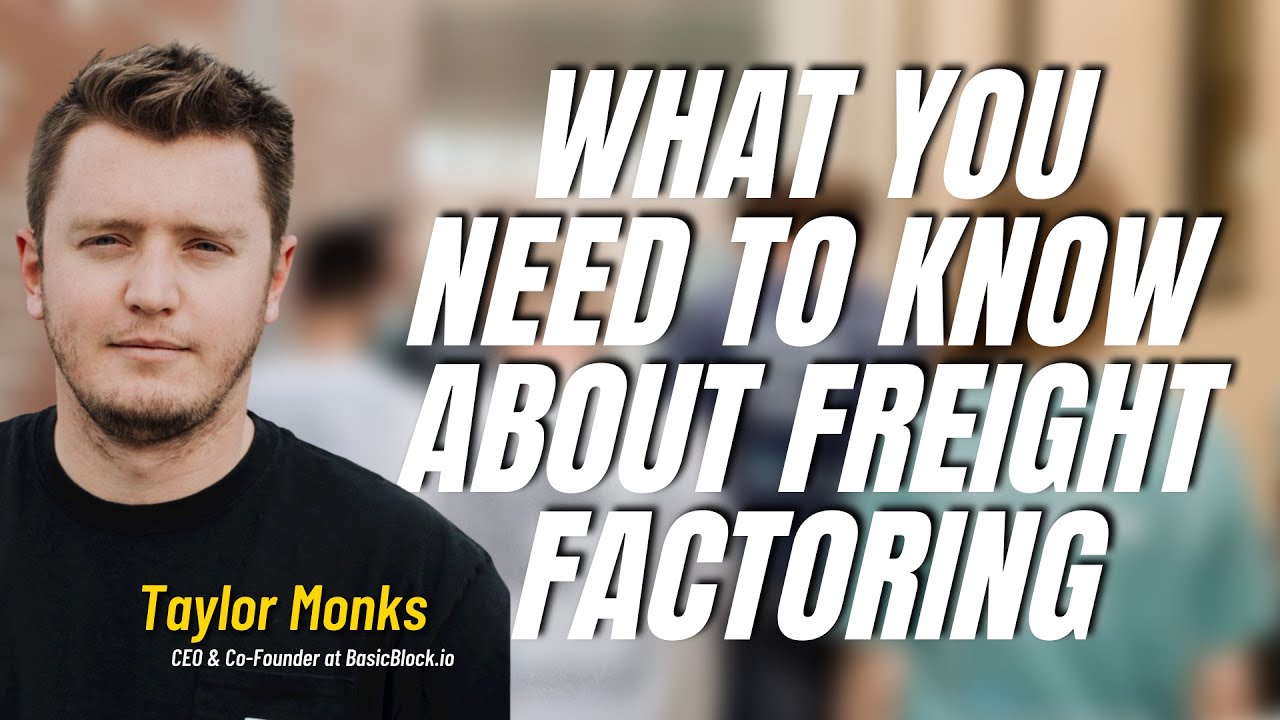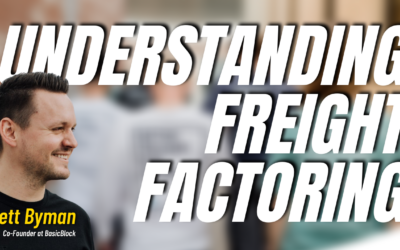What is freight factoring? Who can do it? How does factoring prevent fraud? CEO and Co-Founder of BasicBlock, Taylor Monks, answers all this and more on the latest FreightCaviar podcast.
If you’re not familiar with freight factoring, it’s a financing option for trucking companies where they can sell their invoices to a third party to receive immediate payment. It’s a crucial part of the trucking industry, and Taylor is an expert.
FreightCaviar followers asked some great questions, so let’s jump in to get Taylor’s insights on the ins and outs of freight factoring.
1. What is the reason that brokers are not approved for factoring?
We have our approved broker list for a reason. We pull criteria from credit sources, Better Business Bureau, and Carrier 4-1-1. Our system is like a living and breathing list.
We require them to be in business for a certain period of time, and we require no bad reports on them in x amount of days. Then we look at some other unique things where we have some carriers in what I would call our best carrier segment, and we ask them to haul for brokers. That way, we can learn more about them from experience.
The approved brokers’ list is unique in factoring, and there’s a reason for it – we’re trying to protect ourselves.
2. Why do some factoring companies have recourse in their policy? Doesn’t it defeat the purpose of factoring?
I think factoring companies that do recourse don’t have good technology.
If you’re good at identifying the problems with technology on these invoices and documents and all the other things associated with the load, you can generally catch what’s happening before it happens and not have to have recourse.
Many companies have recourse to protect their mistakes, but we don’t need that. We take action only when it’s operational, and we couldn’t have done anything differently. But if we lose money, we take it on the chin, we’re gonna eat that cost.
3. What are ancillary fees?
For an average invoice size of fifteen hundred or fourteen hundred dollars, you will pay your factoring company about 30 bucks or so. But then, if they charge you ten to fifteen dollars for a wire, that’s a significant percent increase they’re taking from you. And those are important.
These things are really important, and candidly, it makes a massive difference in your contract’s actual true rate. You’ll have companies that offer 1.5 to 2 percent, or whatever percent it is, but then what you don’t realize is they charge you an invoice processing fee of five dollars, or they charge you a wire fee, or a payment fee, or an ACH fee, or a buyout fee.
BasicBlock doesn’t charge any extra fees or ancillary fees. We’re super transparent about what we charge. It’s two percent. For us, it’s just flat, and the other part is there are no buyout fees – no penalties for leaving for us.
4. What’s the best legal way to part ways with your factoring company?
A factoring company we’ve been stealing a lot of customers from plans to charge a $750 fee to truckers to switch companies. That’s so shady.
Fortunately, we offer a free service to connect truckers with a lawyer who can help review their contract and determine the difficulty of switching. It’s challenging to leave some companies, but we’re available to help truckers understand what it would take to get out.
5. Can someone still use BasicBlock if they’re under contract with another factoring company? Can they factor for companies with UCC filings that include accounts receivable?
Unfortunately, factoring requires a commitment to one company, which can be a downside because BasicBlock could win more truckers with our service alone.
To answer the second part, UCC filings on accounts receivable may prevent BasicBlock from factoring for trucking companies. Depending on the situation, carve-outs may allow us to work with trucking companies if the UCC filing is for a different type of asset.
That’s why BasicBlock’s agreements allow clients to leave for free, as there is no real contract.
6. With so many scams in trucking right now, how do you protect your customers from fraud?
First, we look at a ton of variables on a load, an invoice, and a broker and carrier level. Specifically, we analyze all that to determine whether this is real and legitimate. Next, we do some data science to try and predict how and what is the likelihood of it getting paid back to us on time. Overall, we have a robust internal scoring system that we use.
So we’ve gotten good at this. That’s why investors give us millions of dollars. Moreover, many companies across the industry are coming to us to help them detect fraudulent invoices. We have some exciting partnerships with Boom Global and others to be announced soon.
7. How should a carrier choose the best bank for them?
As a truck driver, asking if they have RTP (Real-Time Payment) enabled when choosing a bank is important. Many banks, including major and smaller ones, are adopting this technology, but it’s important to confirm if the bank has it.
Having RTP capability is especially important for factoring because you can get the experience of a wire at a fraction of the cost.
Got more questions about factoring, banks, avoiding fraud, getting approved, or more? BasicBlock has got you covered! Contact the support line at (402) 242-5494 or email hello@basicblock.io to get the necessary answers to keep your business moving. Don’t hesitate to call and get the help you need today!
Want to get the full story? Listen to the full episode on the FreightCaviar Spotify. You can also read more about freight factoring from an interview with BasicBlock co-founder Brett Byman.






0 Comments